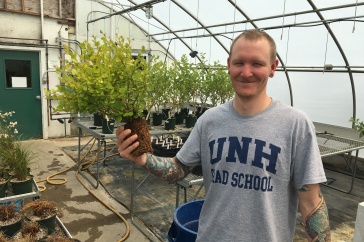
Before beginning his career with the U.S. Forest Service, Jonathan Swett ’21 spent a lot of time doing forestry research at UNH. (Courtesy photo)
This June, Jonathan Swett ’21 packed?his car and drove across the country to a part of California the locals still know as gold country. He’s headed to the Stanislaus National Forest on the western slope of the Sierra Nevada mountains. It’s not your average post-grad road trip adventure: Swett is?embarking on the next stage of his career in the U.S. Forest Service through their prestigious pathways program.
The program prepares talented new grads for critical positions. This will be Swett’s second summer at Stanislaus training to become a timber sale administrator. When he completes his rigorous training, he’ll represent the U.S. Forest Service in its agreements with loggers – a challenging but rewarding post that puts him right at the center of navigating the many goals of a working forest. It’s part contract law, part diplomacy?and part forestry, all performed out in the field with his truck’s tailgate as his desk and his hands perpetually dirty.
“Working with the forest service was the dream,” Swett says. “Now, I’m actually doing it.”
It’s part contract law, part diplomacy and part forestry, all performed out in the field with his truck’s tailgate as his desk and his hands perpetually dirty.
When Swett first came to UNH, however, he admits he didn’t really know much about his chosen major. His family hails from Brooklyn and he grew up on Long Island’s north shore. Though he spent weekends hiking with his dad, logging was just something he saw on television. He hoped forestry would deepen his interest in science and allow him to spend a lot of time outside.
He was right. Studying forestry at UNH meant lots of science – and lots of time outside. Weekly hikes with his field dendrology class to master over a hundred plant identifications. Learning how to use a chainsaw for a research position in his advisor’s lab. Working with nonstinging wasps to see if they could combat the emerald ash borer. Shadowing the UNH forester for an entire summer.
Then, the spring of his junior year, just as he was beginning to look for his next position, the COVID-19 pandemic shut down campus – and local forestry opportunities. He started applying to?federal positions across the country.
One afternoon, he got a call while he was mowing the lawn. It was the forest service. He was a finalist for the pathways program at Stanislaus. He had two thoughts in swift succession. The first was that he couldn’t remember applying for that position. The second was that he didn’t know a lot about California plants.
He got the job and drove straight across the country to his new home: a forest service cabin. There was an old stone fireplace and a stream out back, but also no cell service or Wi-Fi. His first day on the job, he printed out the timber sale administrator training manual – all 400 pages of it.
Still, this was the dream: he was working for the forest service. He liked driving the forest service truck on forest service roads and coming home after a demanding day, taking a swim in the stream, and totally unplugging.
He also appreciated how his new position called on every aspect of his preparation at UNH. Even the intensive course on New Hampshire plant identifications gave him the skills to quickly learn California’s ecosystems.
And sometimes, he’d round a corner and come to a remarkably stunning viewpoint, surrounded by forest and mountains, in a part of the country he never expected to land.
“I’d think to myself: somebody’s paying me to do this,” Swett says.
This summer, he returns for more of it.
-
Written By:
Ali Goldstein | CPA



















































